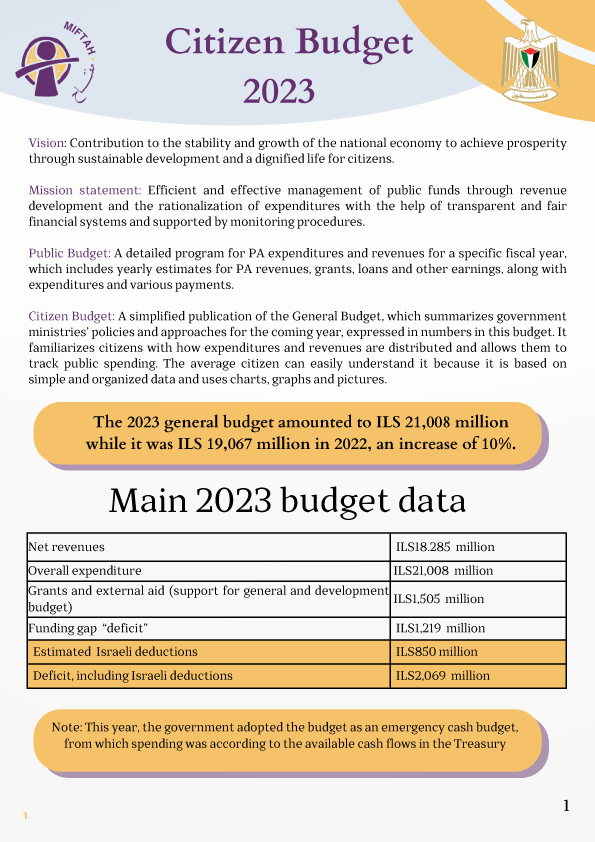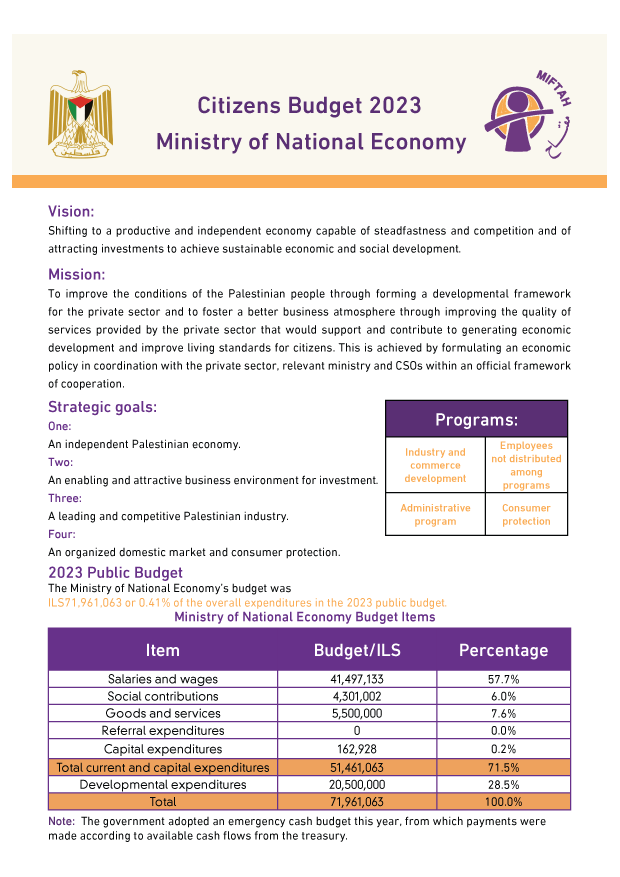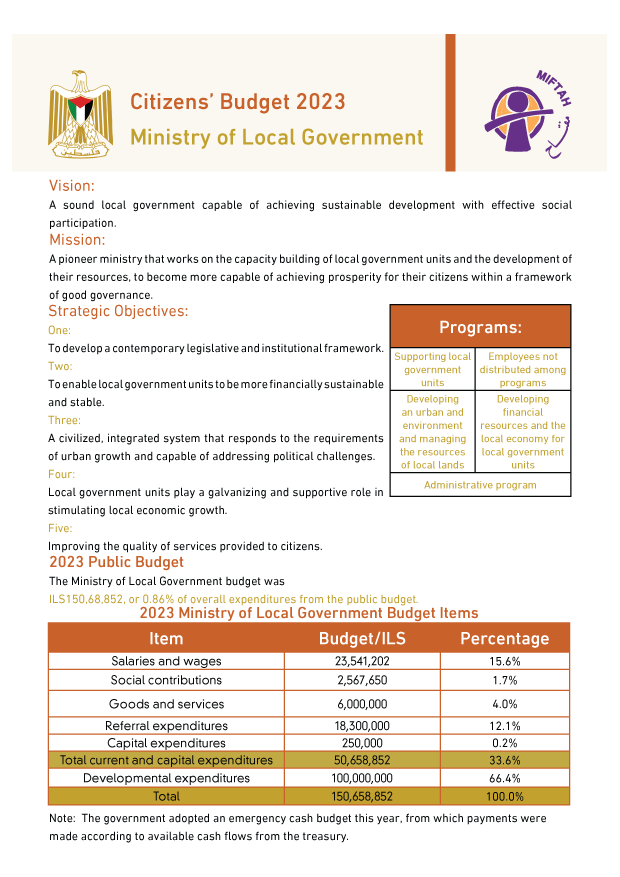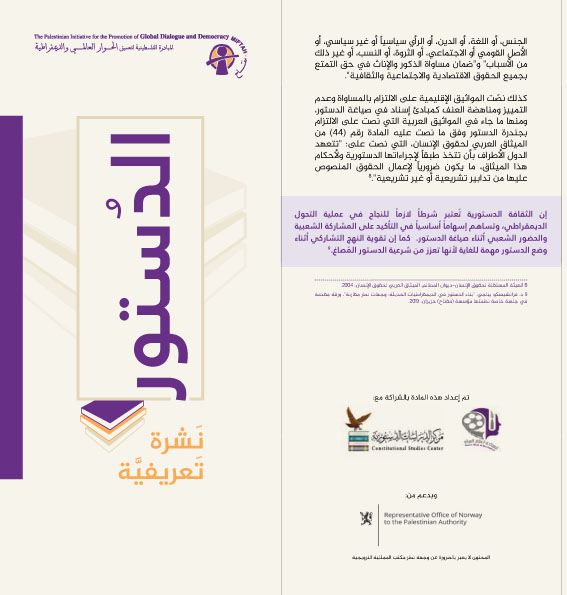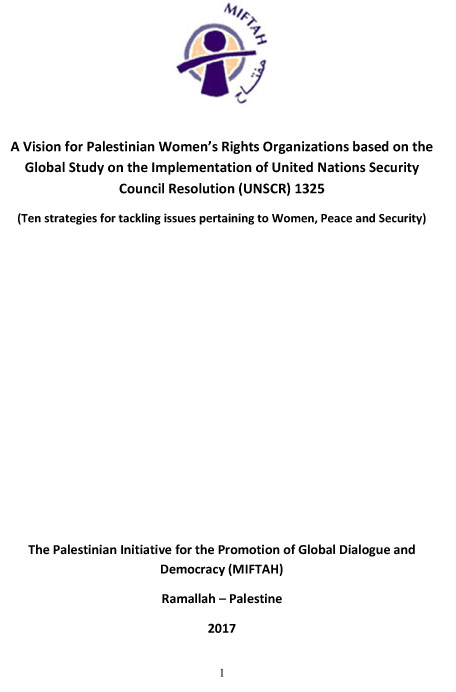Jerusalem constitutes the core of Palestinian history and identity, and the capital of the Palestinian state. Jerusalem has long faced Judaization attempts as Israel, the occupying power, makes exclusive claims to the City; imposing a Jewish-only narrative to alter the demographic and cultural character of the City and erase the indigenous Palestinian population and their rich and diverse heritage and identity.
In 2022, MIFTAH launched its Jerusalem Track, a series of episodes highlighting the main struggles faced by Palestinians under Israeli occupation and apartheid in Jerusalem, focusing on personal stories to tackle wider Israeli policies and practices aimed at expelling the indigenous Palestinian population in Jerusalem and replacing them with Israeli settlers.
The Armenian Quarter in occupied Jerusalem: 'All Christians here are at risk'
Date posted: January 10, 2024
By MIFTAH

Introduction
As the genocide in Gaza persists, Israeli efforts to ethnically cleanse and displace more Palestinians to replace them with settlers continue all over Palestine. One prominent and current example is the Armenian Quarter in occupied Jerusalem.
Jerusalem has the world's oldest Armenian diaspora community, going back 2,000 years. Nowadays, this historic quarter is under threat of demolition and confiscation. The hotel development company Xana Gardens Ltd. is claiming rights over property in the Armenian Quarter to develop a hotel over it. Israel has always been trying to change the demographics of the old city and impose a Jewish supremacy in the Muslim and Christian parts of the city in a variety of ways. The Israeli government relies heavily on settler organizations to take over land and property and on settlers who act as thugs to harass and intimidate residents to get them to leave.
From online to offline: Censorship in occupied Jerusalem
Date posted: December 14, 2023
By MIFTAH

Introduction:
Since the start of the war on October 7th, Israel’s parliament has passed an amendment to the country’s "counterterrorism" law that introduces the “consumption of terrorist materials” as a new criminal offense. This has given the green light for Israel to conduct mass arrests in occupied Jerusalem, as well as Palestinian citizens of Israel, and prevent journalists from doing their job. On this episode of Jerusalem Track, we talked to experts Ziad Hammouri and Randa Siniora to learn more.
The Ghost town of Jerusalem
Date posted: December 13, 2023
By MIFTAH

Introduction:
With the ongoing war on Gaza, Israeli policies towards Palestinians in Jerusalem have turned for the worse. Many fear to speak out even amongst each other, as arrests have been rampant. In this month’s Jerusalem Track episode, we talked to Palestinian Jerusalemites to hear more.
Seeping into the Old City: Israel's Economic Takeover of Jerusalem
Date posted: October 03, 2023
By MIFTAH

Introduction:
When we discuss the Judaization of Jerusalem, we often only focus on the physical methods of control such as home demolitions, forced displacement, and settlement expansion. There is another, often overlooked, economic component that is also at play in this process. Over the years, 350 Palestinian shops in the Old City of occupied Jerusalem have been forced to close because of a lack of tourism during the pandemic and high taxation by Israeli occupation authorities. Israel’s taxation policy has suffocated Palestinian business owners who are unable to pay the high taxes imposed by the illegitimate municipality. In this episode, we met with Palestinian business owners in occupied Jerusalem to discuss what it is like to be a business owner in the city, and how they remain steadfast in holding on to their shops despite all the obstacles they face.
From Africa to Jerusalem: Jerusalem's Afro-Palestinians
Date posted: August 10, 2023
By MIFTAH

Introduction:
In this episode of Jerusalem Track, MIFTAH visited the Old City’s African Quarter. The African community is one of the many micro-communities located in Jerusalem’s Old City, facing the same challenges and restrictions imposed by Israeli occupation authorities against all Palestinian Jerusalemites.
The African community in Palestine dates back to the early 19th century when Muslim immigrants from Chad, Sudan, Nigeria and Senegal came and settled in Jerusalem after making pilgrimage to Mecca. Afro Palestinians have played an important role in Palestinian history since, and many have become leading political figures.
We met community leaders Mousa and Maali at the African Community Society, located right outside of the main gate of the Al Aqsa Mosque. Maali talks about her identity as a woman from the Afro-Palestinian community. Women from Jerusalem’s African community are persecuted on three fronts: 1. Being Palestinian, 2. Being a woman and 3. Being Afro-Palestinian. Her identity plays a unique role in Palestinian society and it is one that she is proud to hold.
Twice displaced: Three generations of forced displacement
Date posted: July 04, 2023
By MIFTAH

Introduction:
In January of 2022, the home of Mahmoud Salihiya was demolished by Israeli occupation forces in the Sheik Jarrah neighborhood in occupied Jerusalem. In the middle of the night as the family was asleep, Israeli police forcibly evacuated the family out into the rain and demolished the home they have been living in for over 70 years. This came after weeks of protest by the Salihiya family and international solidarity groups, hundreds of whom stood outside the barricaded home to protect it from bulldozers.
This was the second time the Salihiya family had been forcibly displaced. This first being in 1948 during the Nakba, from the depopulated village of Ein Karim. Mahmoud’s family was driven out of their home while Israeli massacres were being committed in nearby villages. His grandfather came to Sheik Jarrah, where he purchased a home. The Salihiya family had been continuously living in that home since, until its demolition last year.
The demolition of the Salihiya family home is part of large-scale efforts by Israel to ethnically cleanse Jerusalem of Palestinians and replace them with Israeli settlers. Since falling under Israeli occupation in 1967, more and more land has been annexed by Israel as part of the Judaization of Jerusalem. So far in 2023 alone, 79 Palestinian-owned homes and businesses have been demolished in occupied Jerusalem. It is nearly impossible for Palestinians to obtain a permit to build or expand their existing homes.
Denied: Freedom of worship in Jerusalem
Date posted: June 03, 2023
By MIFTAH
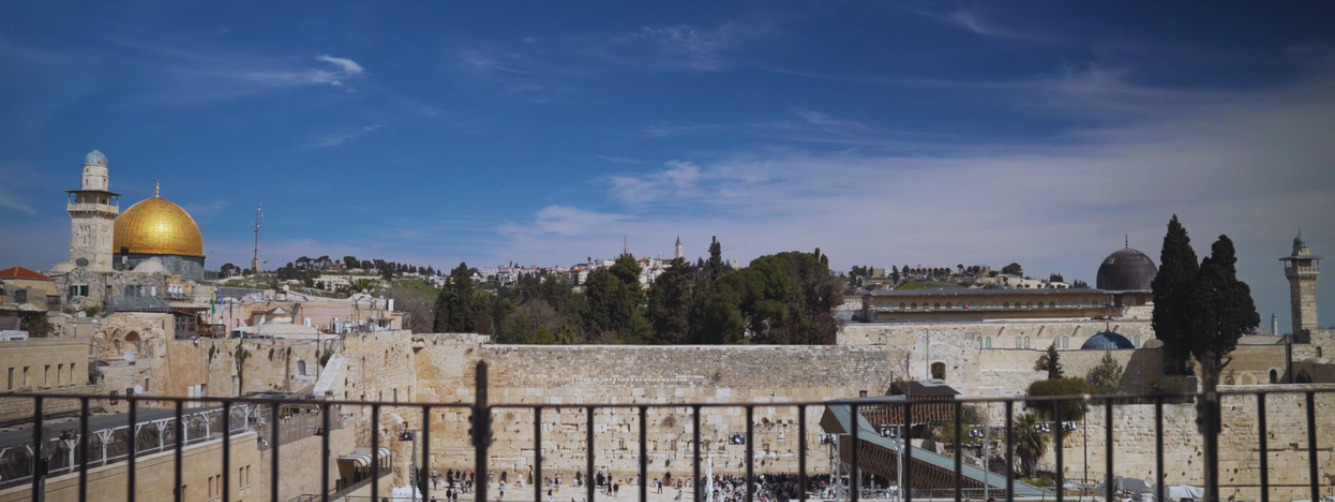
Introduction:
Israel has always attempted to take over Jerusalem, altering the demographic character of the City to impose a Jewish-only narrative, curtailing freedom of worship for Palestinian Muslims and Christians in Jerusalem. However, over the past five years, restrictions on and violation of freedom of worship in Jerusalem have taken a dangerous upward arc. This escalation is largely, but not exclusively, attributed to the rise of the far-right extremist government in Israel, with the likes of National Security Advisor Itamar Ben-Gvir in particular.
Israel has divided the Al Aqsa Mosque Compound, the third holiest site for Muslims, both temporally and spatially. Temporally, Israeli authorities have designated certain time slots for the entry of Israeli settlers into the compound to perform provocative tours, in morning, noon and afternoon intervals. During these times, Israeli authorities violently vacate Muslim worshippers from the site to make way for the Israeli settlers who are heavily guarded by Israeli occupation forces. Spatially, Israel aims to divide the location between Jews and Muslims, similar to the Ibrahimi Mosque in Al-Khalil/Hebron.
Christian holy sites are also a target of attacks by Israeli occupation forces and settlers in Jerusalem. This year alone, extremist settlers attacked the Gethsemane Church and the Church of the Imprisonment of Christ, causing material damages to both. Often, Israeli settlers spit, harass and curse at Christian clergy and nuns in the Old City, assaults that are conducted with complete impunity.
Freedom of worship is supposedly safeguarded by international law and conventions as a basic civil right. Article 18 of the Universal Declaration of Human Rights stipulates: “Everyone has the right to freedom of thought, conscience and religion; this right includes freedom to change his religion or belief, and freedom, either alone or in community.” Article 18 of the International Covenant on Civil and Political Rights states: “This right shall include freedom to have or to adopt a religion or belief of his choice, and freedom, either individually or in community with others and in public or private, to manifest his religion or belief in worship, observance, practice and teaching.” Through such actions, Israel also violates the Jerusalem Status Quo Agreement.
'Demolished with my own two hands'
Date posted: January 24, 2023
By MIFTAH
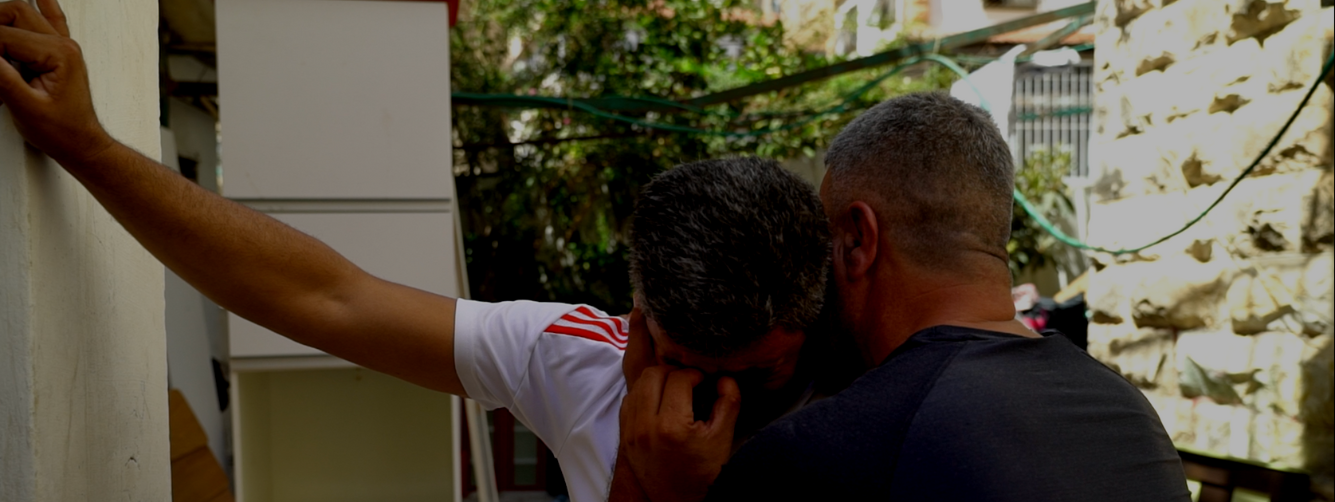
“Silent transfer” is a term used to express an Israeli occupation policy aimed at vacating Jerusalem of its indigenous inhabitants, through creating an oppressive and coercive environment of harsh living conditions and economic circumstances. Through long-term strategies such as this one, the economic and living conditions of Palestinian Jerusalemites have gradually but steadily worsened as life’s burdens continue to increase. Israel imposes hefty taxes and marginalizes and isolates Palestinian neighborhoods in overcrowded areas to realize this goal. In these areas, urban expansion is “illegal” without a permit, which are almost impossible for Palestinians to obtain. If and when Palestinians build anyway, even if one room, they are most often slapped with a demolition order, executed either by the illegal Israeli Jerusalem municipality or they are forced to carry out the painful task on their own.
Thus, Palestinians are left with two options: the first is find less expensive living spaces in neighborhoods such as Kufr Aqab, which are already highly overcrowded and unregulated, and the second is to build without a permit to meet the needs of their naturally growing families.
Devouring Jerusalem
Israeli occupation authorities devised the so-called “Greater Jerusalem” project years ago, aimed at replacing Palestinian Jerusalemites with Israeli settlers through various means. This began with the confiscation of two-thirds of the land in Jerusalem, estimated at 24,500 dunams, following the establishment of Israel on historical Palestine in 1948, based on the “Israeli Planning and Building Law” of 1965, two years before the 1967 occupation. On this land, it built 11 neighborhoods, earmarked exclusively for new Israeli settlers. Occupation authorities also decided to effectively cancel all Jordanian structural plans in these areas, in order to make way for its settlement enterprise, including in expansive areas designated as “landscape lands” where building was prohibited.
After several Israeli alterations to structural plans, the Arab Studies Mapping Department showed how the area of land allocated for Palestinian construction had been reduced to just 13% of the overall urban space. This is despite the fact that Palestinians comprise approximately 40% of the city’s population. Data in 2014 from the Land Research Center puts this number closer to 30%. Likewise, data from the Jerusalem Institute for Policy said the population density in 2015 in Palestinian neighborhoods in occupied East Jerusalem had almost reached double the density of settlement neighborhoods in the city, at an average of 1.9 individuals per room. Meanwhile, the population density in West Jerusalem was around 8,300 persons per km2 and 9,000 settlers km2 in East Jerusalem settlements. In Palestinian neighborhoods, the number reaches 13,500 people per km2, according to settlement affairs expert, Khalil Tufakji.
Occupation authorities not only altered structural plans, but found even more “legal” ways to devour additional Palestinian land in East Jerusalem by declaring them “national parks”. The mere declaration prevents construction in vast areas of land, fully and permanently. Until today, there are seven of these parks in occupied East Jerusalem alone, the most insidious being the 1,100-dunam park on the peripheries of the Old City, in Silwan’s Wadi Helwa neighborhood. This park extends all the way to Wadi Joz to the east and along the area from Jaffa, Damascus and Herod’s Gates, to the northeastern corner of the Yousifiyeh cemetery.
Parks to besiege Jerusalemites:
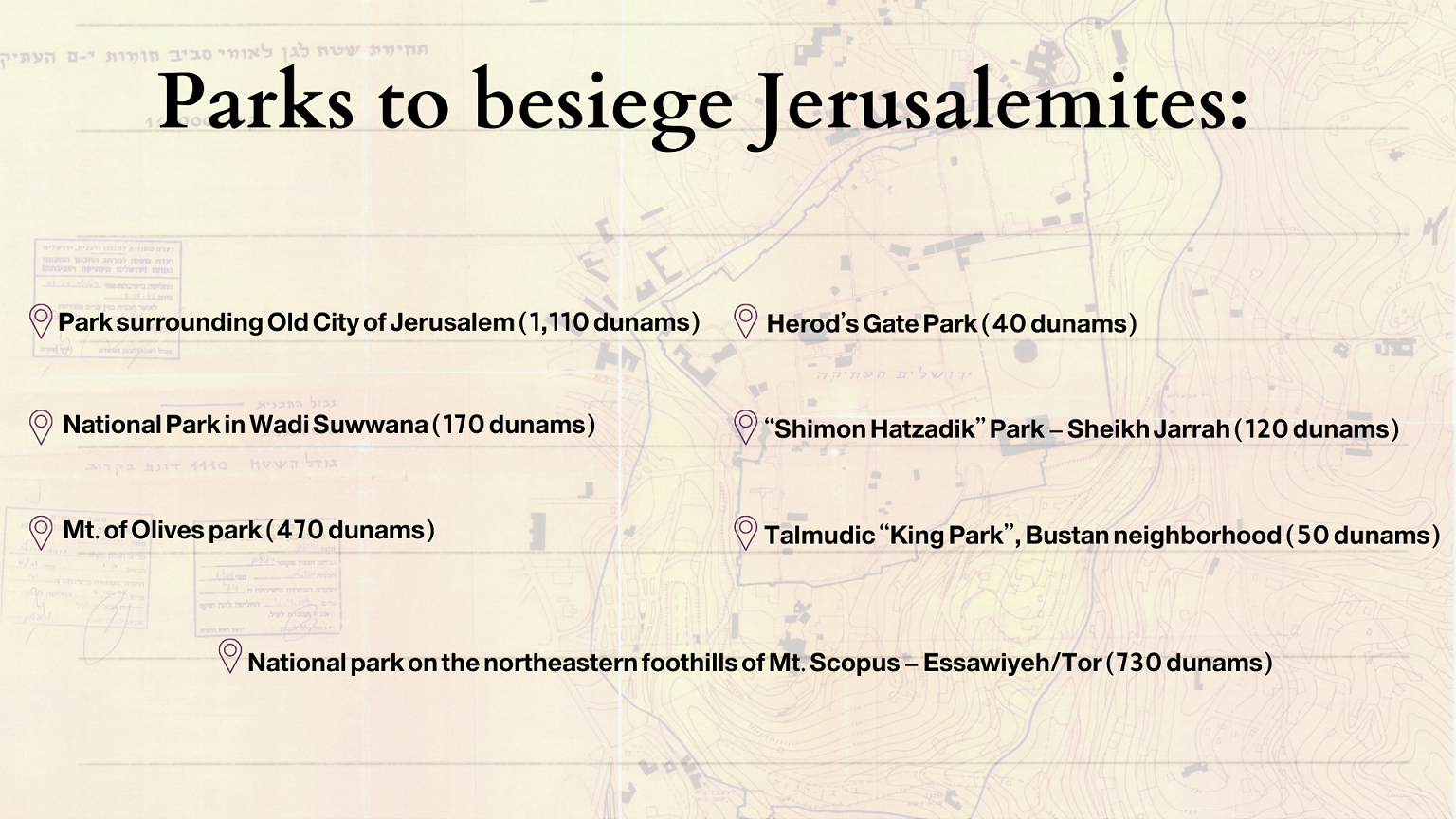
These Israeli plans correspond with their disregard and failure to formulate detailed construction maps for Palestinian neighborhoods. It should be noted that building permits cannot be issued without these maps, which results in an acute shortage of residential and public buildings and infrastructure facilities in these areas, including roads, sidewalks and water networks. This forces Palestinians to live in highly populated and congested areas, to move to areas far from the center of Jerusalem, or to build or expand their homes without licenses.
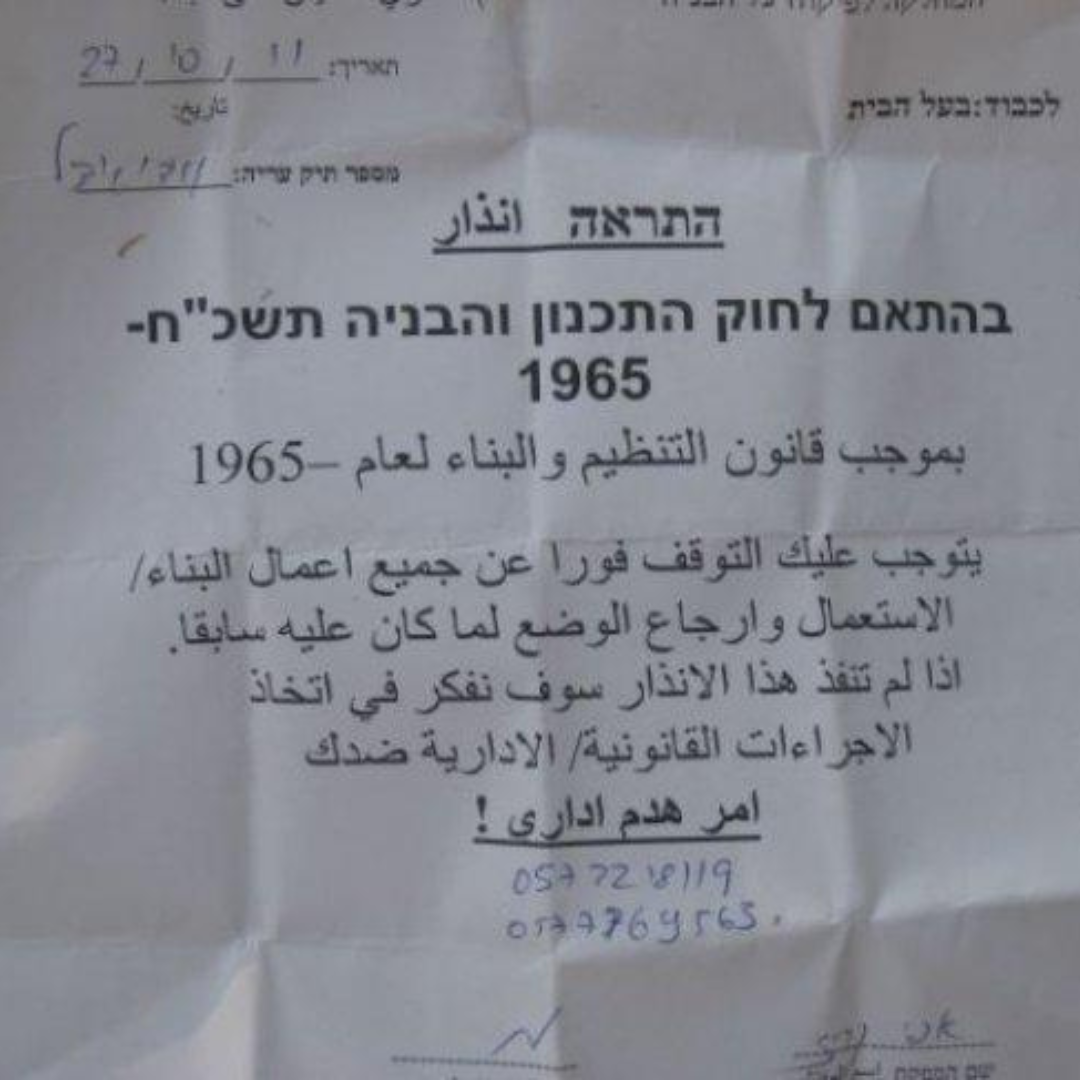
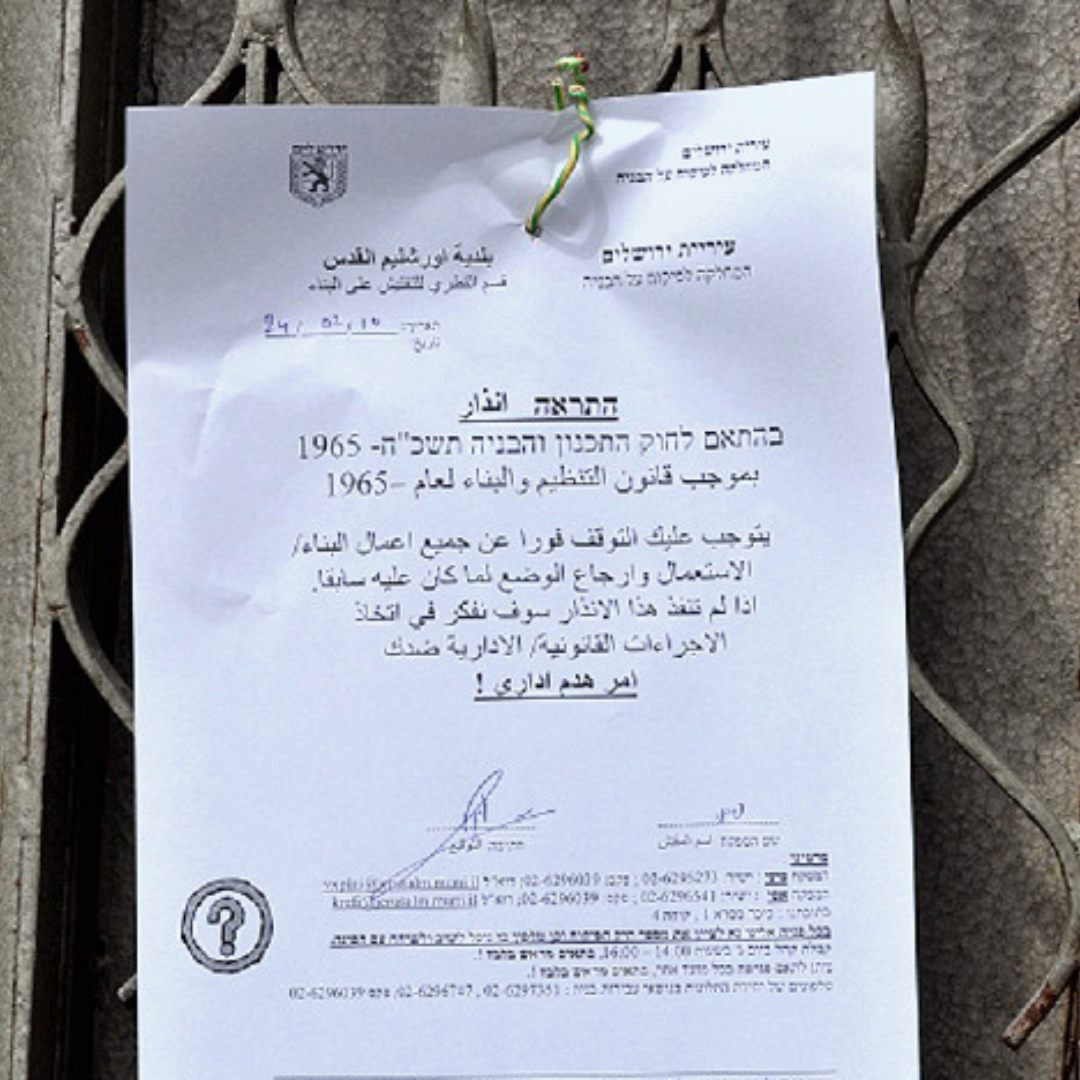
Self demolitions
“Your home was built without a permit, which means it is illegal. You must demolish or remove it as soon as possible and also photograph the building after it is demolished and send it to the inspections department of the municipality’s planning and building committee” –
Israeli occupation forces threaten owners of homes at risk of demolition, with hefty fines in lieu of the cost of an Israeli municipality demolition. This is over and above the money they spend in an attempt to obtain building permits for any structure or additional room. Such a situation puts Palestinian Jerusalemites in an impossible position, caught between the rock of having to demolish their own home or the hard place of footing the hefty municipality bill. In either case, their house ends up in a pile of rubble. The only small silver-lining to demolishing their own homes is they ensure that their personal belongings and furniture are saved.
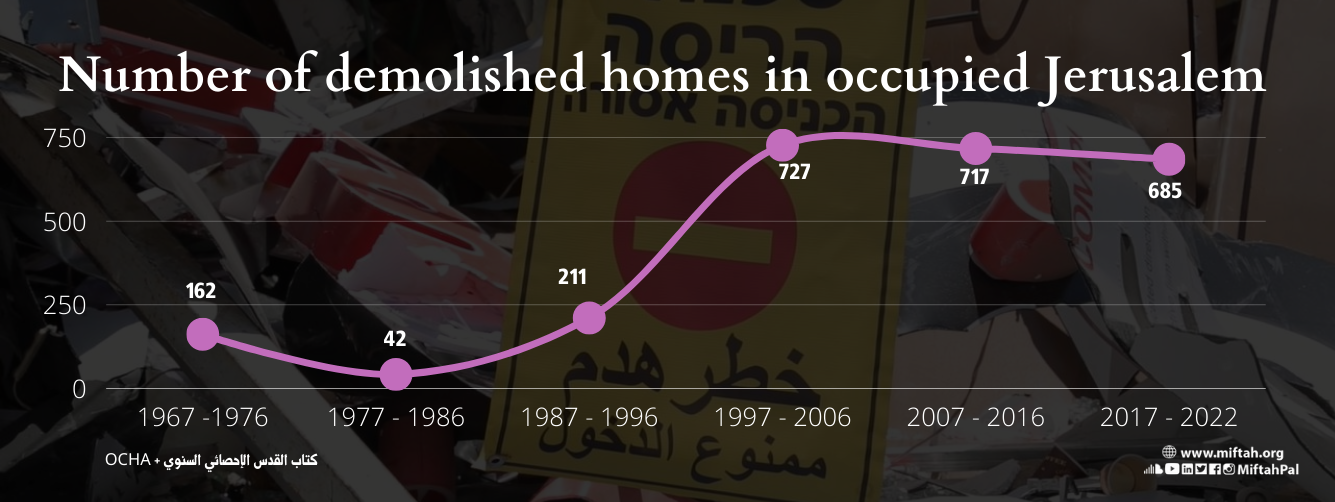
The Abu Ramouz family
The Abu Ramouz family has been in a long and arduous battle with the illegal Israeli Jerusalem municipality. Last year, it even succeeded in securing a stay on the demolition of their home, but the battle ultimately ended in a final court ruling: the family must tear down their home, where they have lived for over seven years. If they chose not to heed to order, the family would find itself under the weight of heavy fines and fees, including if they failed to remove the rubble of their demolished home.
UN-OCHA statistics maintain that 1,201 structures, mostly homes in occupied Jerusalem, were demolished, displacing 27,411 people and partially impacting another 5,566. The agency’s statistics also show that 75% of the victims were women, girls and children.
Women shoulder the lion’s share of responsibility in restoring stability to the family in cases of demolition. This is because for women, loss is about social and not only material value. Women are the family members who often forge the strongest bonds inside the home.
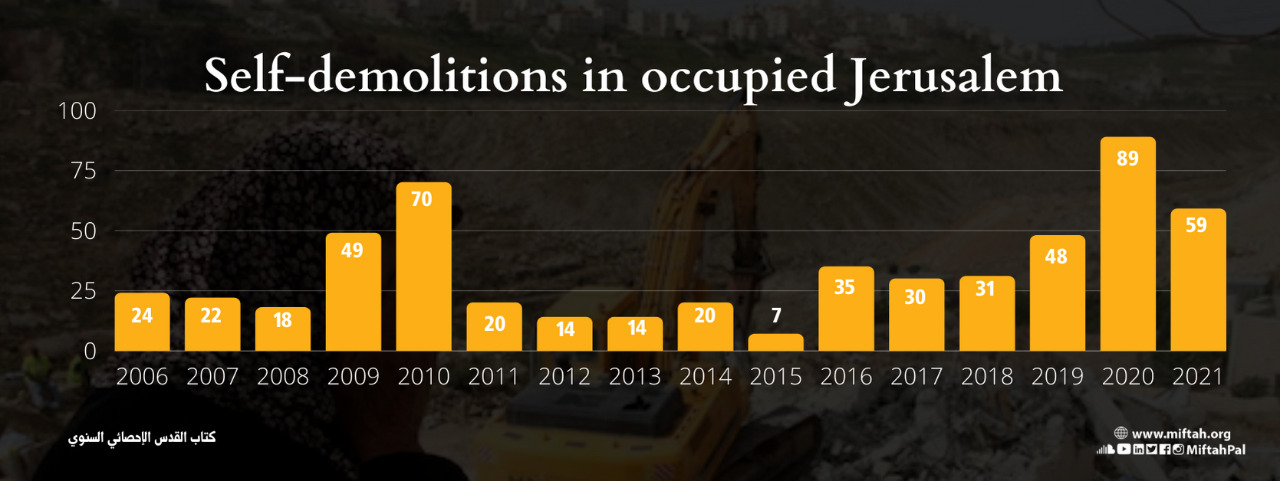
Self demolitions in occupied Jerusalem
Case studies have shown that forced displacement and home demolitions result in multiple human rights violations, particularly for women and children. These include the right to education, bearing the burdens of the household and health care, all byproducts of the loss of privacy and a safe space. In addition, the tremendous amount of pressure on the family negatively affects their relationships, which makes mothers feel that their emotional, material and authoritative roles have been undermined.
The right to housing is a fundamental right
Article 25 of the Universal Declaration of Human Rights and Article 11 of the 1966 International Covenant on Economic, Social and Cultural Rights both state that every person has the right to an adequate standard of living for himself and his family, including adequate food, clothing and housing, and to the continuous improvement of living conditions. Home demolitions are a grave violation of this right.
The policy of demolishing homes falls within the category of grave violations and an arbitrary measure that could unrightfully result in the destruction and confiscation of ownership, according to the 1949 Fourth Geneva Convention on the protection of civilians in times of war. Article 53 of the Convention: “Prohibits any destruction by the Occupying Power of real or personal property belonging individually or collectively to private persons, or to the State, or to other public authorities, or to social or cooperative organizations, is prohibited, except where such destruction is rendered absolutely necessary by military operations.” Also, Article 33 stipulates: “No protected person may be punished for an offence he or she has not personally committed. Collective penalties and likewise all measures of intimidation or of terrorism are prohibited. Pillage is prohibited.”
Home demolitions as a war crime
International criminal law considers wide-scale home demolitions illegitimate and in violation of international law. According to Article 8.2 of the International Criminal Court Rome Statute: “Extensive destruction and appropriation of property, not justified by military necessity and carried out unlawfully and wantonly” is considered a war crime.
No prison like home: House arrest in occupied Jerusalem
Date posted: December 28, 2022
By MIFTAH

Israeli occupation authorities adopt several ways of restricting the freedoms and right of movement for Palestinian Jerusalemites. This includes arbitrary arrests and high sentences, in addition to various charges under the pretext of incitement including social media posts. One form of restriction is house arrest, which is especially debilitating for children, who are forced to stay inside their home or a relative’s house, if ordered. Members of the household are then made to sign a pledge to monitor and prevent the child from leaving the house, effectively turning mothers and fathers into prison wardens. The child’s daily activities, meanwhile, are grossly hindered, including basic rights such as going to school or seeking medical treatment, because violating the Israeli court order means being slapped with hefty fines.
There are two types of house arrest: the first obligates the condemned person to remain in his/her house and not leave under any circumstances, for a specific period of time. The second type is that the child/man/woman must abide by a court order stipulating they must remain at a relative’s house, far from their own place of residence. This disperses the family and causes anxiety and tension between the child and the family, leaving them all with social and psychological scars.
Israeli occupation authorities mete out this punitive measure, particularly on Jerusalemite children under 18 and especially those 14 or younger. This is because Israeli law does not allow actual prison sentences for children under 14. Instead, they are placed under house arrest through the duration of the court proceedings, which are often lengthy, until they turn 14 and can be given an actual sentence. The period in which the child is under house arrest is not calculated, even if it is for years or multiple times.
While there have been cases of house arrest since the beginning of 2014, this number began to rise after the wave of protests following the kidnapping of child Mohammed Abu Khdeir in July of 2014. Abu Khdeir was snatched by Israeli settlers, tortured and burned alive, prompting widespread protests, including from other children. The number rose again during the “Jerusalem uprising” in October, 2015 and has continued until this day.
The policy of house arrest has infringed on the personal freedoms of not only children, but all sectors in Jerusalem, including journalist Lama Abu Ghosheh (below, with her daughter Karmel). She spent 10 days in solitary confinement and was released from prison mid-September and put under strict house arrest conditions, which she is still under to this day.
Psychological impact of house arrest:
Professor of sociology, Dr. Bernard Sabella, likened house arrest to the coronavirus pandemic. He said at the beginning of the pandemic, everyone – young and old- were forced to stay at home for at least a month, drastically changing relationship dynamics inside families. Parents assumed their instinctive role as guardians over their children, irrespective of their ages, naturally taking on the role of monitor. “Imagine,” he said, “How they now have to be more than just a guardian. Now they give out orders such as “No going out…no moving around” because they are afraid for their child, afraid they will be taken again, thrown in jail or interrogated.”
Dr. Sabella notes how this situation undermines the relationship between child and parents, especially when the former is deprived of all the activities they are used to, such as spending time with friends and schoolmates or going on trips. This, he maintains, scars the child, who usually becomes much more introverted and sometimes resorts to bad habits such as smoking. The child loses all sense of protection by their own family and is torn from their normal social and psychological environment.
Sabella cites studies that show how institutionalized children or children under house arrest are more likely to commit a felony or resort to violence. He points out that house arrest should be limited to a maximum of two weeks and that the family should be allowed to seek legal, social and psychological counseling if necessary, especially given the long-term effects of this experience.
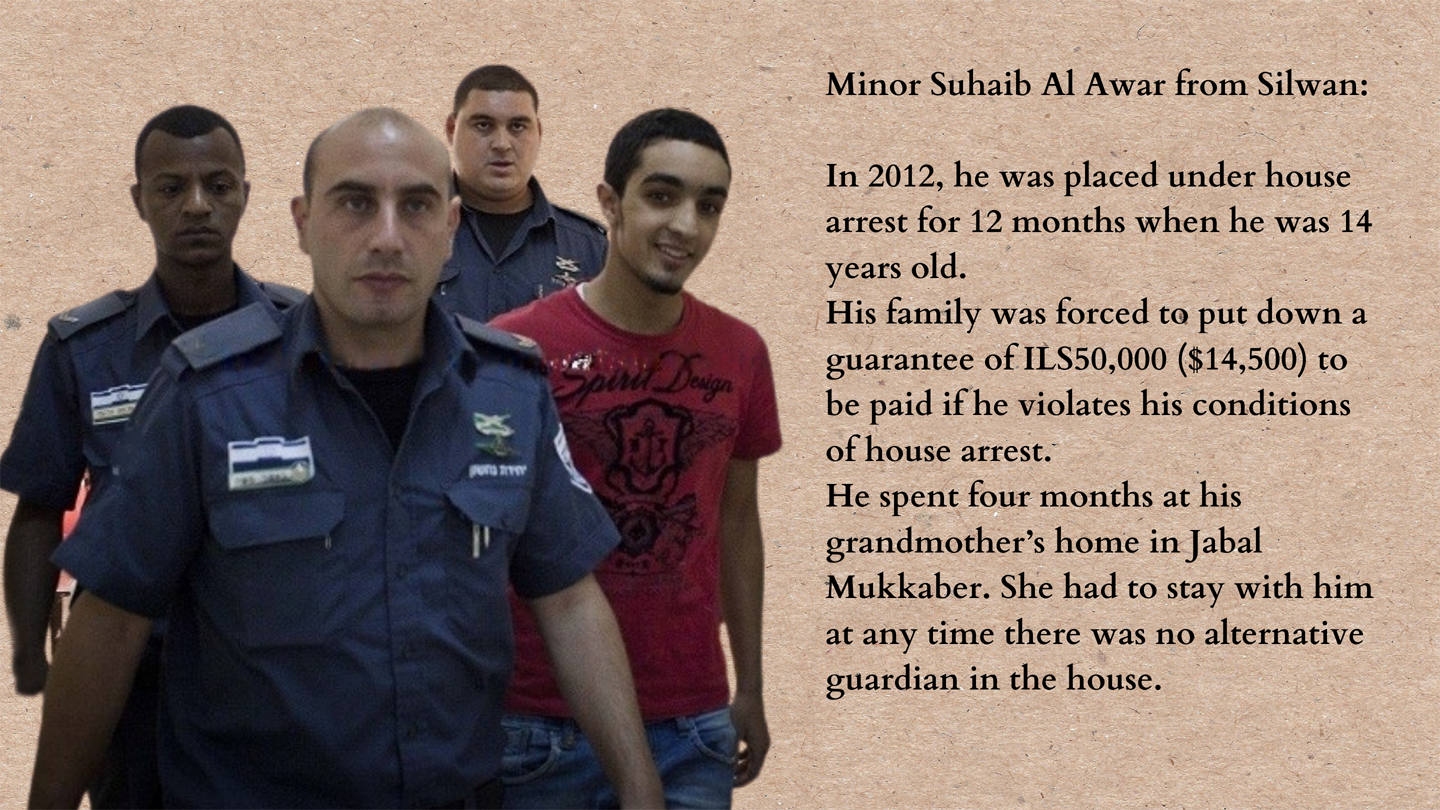 Suhaib Al Awar at his trial
Suhaib Al Awar at his trial
House arrest creates a sense of loss among children of their social security and psychological stability because they are kept in a confined area for days or months without being permitted to leave the house or get fresh air and sunlight. Statistics provided in a MIFTAH factsheet on house arrest indicates that 85% of children in occupied Jerusalem suffered from mental disturbances after being detained or put under house arrest, in addition to suffering physical manifestations such as involuntary bedwetting. According to clinical psychologist, Dr. Murad Amro, some children refuse to go back to school after being under house arrest as a form of rebellion, resulting from their lost sense of security, anxiety and inability to govern their own lives.
Sabella, meanwhile, called for a halt to house arrest for children, pointing out that the policy is in contravention of the UN Convention on the Rights of the Child, which Israel signed in 1991. He called for a strong stand and a clear message, saying that any house arrest that continues for over two weeks is in flagrant violation of child rights and in breach of the Convention signed by Israel.
Ali Qneibi, waiting for life to start
Ali Qneibi, 14, sits at a window overlooking the courtyard of his house, which he is not allowed to leave. This is his second house arrest, in March 2022, just five days after his first house arrest order ended.
Israeli occupation authorities imposed conditions on Ali’s second arrest, including an order preventing him from being 30 meters within distance of the Israeli settler who took over a home three meters from the Qneibi family home. This meant that, once he is allowed to leave the house, he will still have to take a much longer road that does not pass in front of the home occupied by the settler.
Ali is always chatting with his friends, who meet to talk with him near this “window to the world”.
This time around, Ali was blindfolded and gagged when he was arrested in the Old City of Jerusalem. He was also badly beaten on the head, neck, belly and face and during interrogation, he was not allowed to eat or drink water. Finally, he was ordered to remain under house arrest for five days.
Ali’s parents
Ali’s father, Rateb Qneibi, who is disabled, said, “Ever since Ali has been under house arrest, he has not been able to participate in any family or social functions, which means someone in the family has to stay with him so he does not violate the order. If he does, his guarantor will be fined ILS60,000 (some $12,000).
His mother, Inas, said, “All of us have become guards and wardens in this prison called home. Ali is the prisoner and we are his prison wardens. Imagine how hard it is to be a prison warden to your own child just because you are forced to carry out the [Israeli] occupation’s orders?”
She continued, “Ali has every right to live a normal life. He has a right to go to school, to play with his friends and to come with us to family functions. The [Israeli] occupation has deprived our son of all these things. He is still under house arrest…but before this, every time something happens in the neighborhood he gets arrested and our house is raided by soldiers or this settler who has turned our lives into a living hell.”
As for Ali, he is waiting for his court session, which is scheduled for the beginning of 2023. He will be at the mercy and whim of the court that day, which will rule in favor of his release, renewal of his house arrest or actual prison time. Ali says that if he is sentenced again, he would rather be given a specific amount of jail time than open-ended house arrest.
Facts and figures
The Committee for Prisoners’ Families in Jerusalem note that Israeli occupation authorities issued approximately 2,200 house arrest orders from January 2018 to March 2022, 114 of them for children under 12.
The number of house arrests dropped during 2021 and 2022 after a new wave of unjust Israeli laws, which allow the detention of minors under 14 and to impose harsher punishments on children charged with throwing stones. This gave Israeli police and courts broader powers to continue detaining children and to hold them for longer periods in prison.
Below is the distribution of cases of children under house arrest according to the Committee for Prisoners’ Families in Jerusalem:
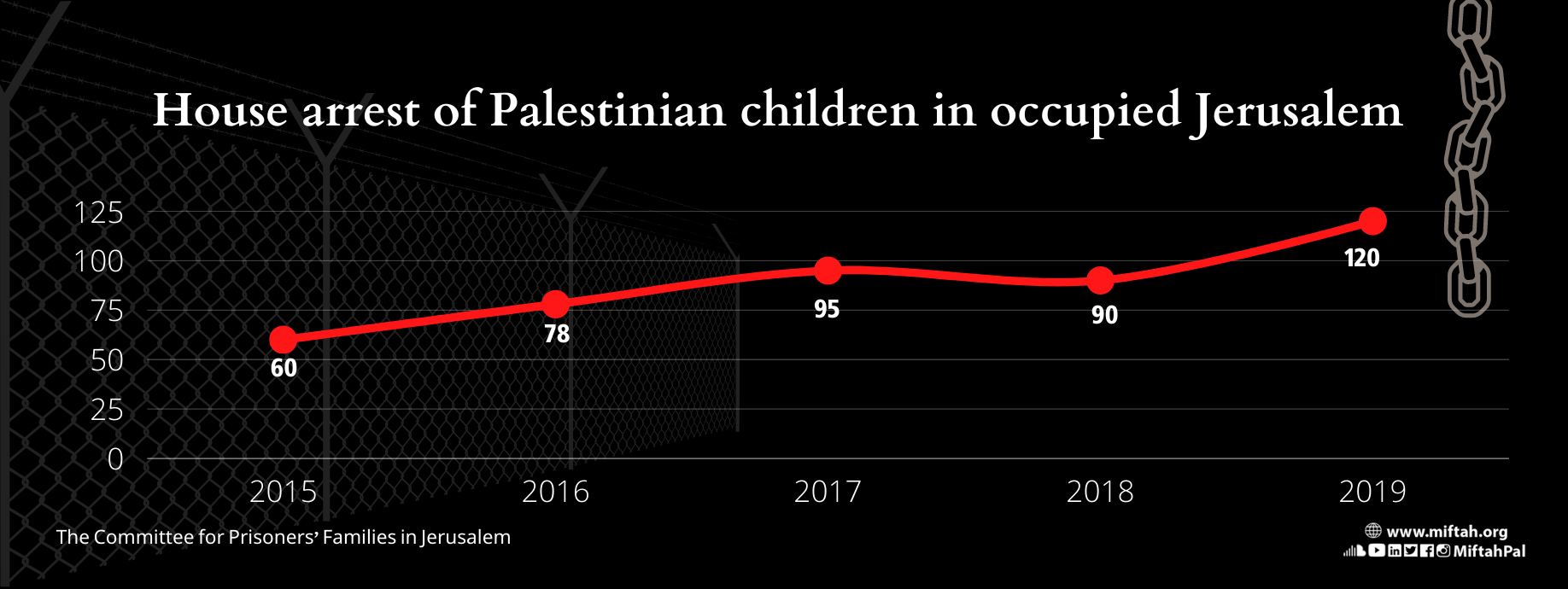
House arrest and international law
Attorney Medhat Deeba says international human rights law and international humanitarian law provide ample space for guaranteeing children’s freedom, safety, protection and dignity. Article 37a of the 1989 Convention on the Rights of the Child stipulates that, “No child shall be subjected to torture or other cruel, inhuman or degrading treatment or punishment”. Meanwhile, 37b stipulates that, “No child shall be deprived of his or her liberty unlawfully or arbitrarily.”. The same article confirms that “the arrest, detention or imprisonment of a child shall be in conformity with the law and shall be used only as a measure of last resort and for the shortest appropriate period of time”, in addition to the right to challenge the legality of the deprivation of his or her liberty before a court or other competent, independent and impartial authority.”
The Fourth Geneva Convention calls for children to be removed from targeted areas in the case of armed conflict and for protecting them from the impact of war. However, in the case of house arrest, he says, the exact opposite is true. Israel takes arrest as its first option with children and treats them as adults. “They are beaten and humiliated from the moment of their arrest and they are then questioned and interrogated without the presence of a lawyer or their parents, in clear violation of international law.”
Once the child’s interrogation is over, court proceedings begin. The child is detained at home as a first option, for a lengthy period of time that could exceed a year, during which drawn-out court measures are conducted. Then, the moment the child is sentenced to jail time (if he is indicted) the period of his house arrest is not deducted from his sentence, which could range anywhere from three to six months.
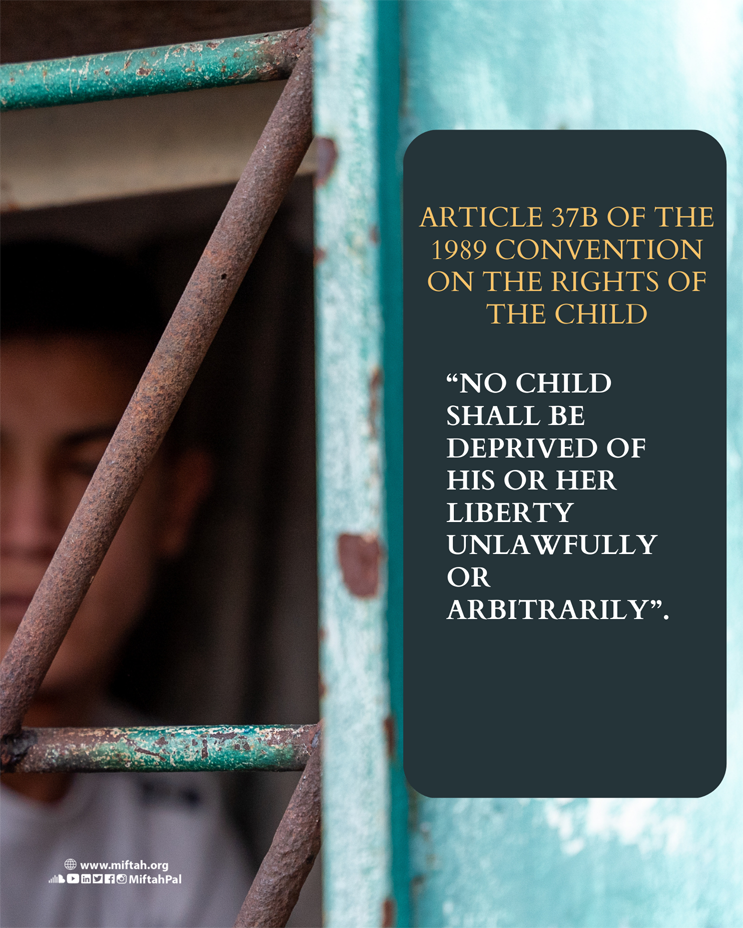
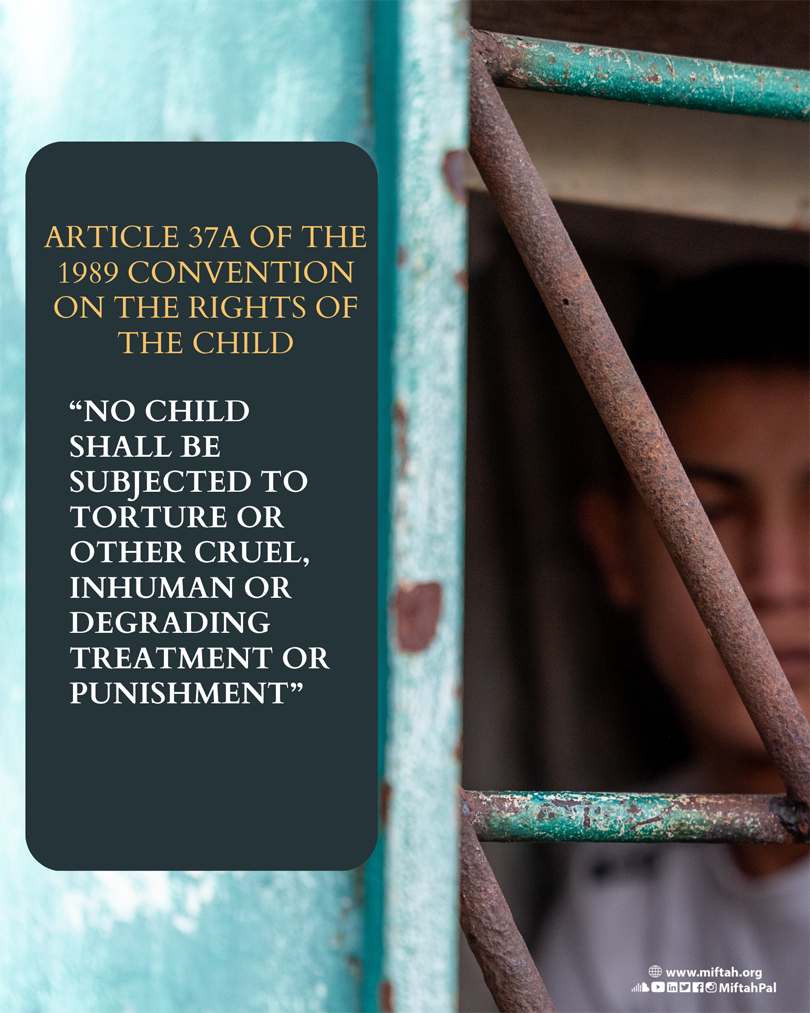
'Israelizing' education in Occupied Jerusalem
Date posted: November 12, 2022
By MIFTAH
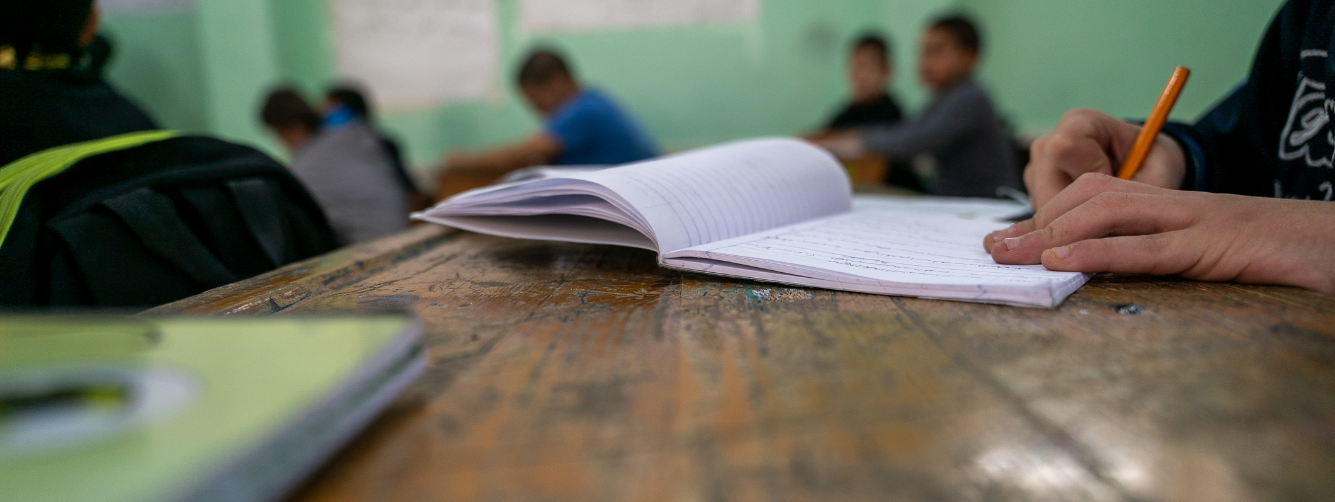
Palestinian Jerusalemites face a myriad of challenges in the occupied city, one of which is education. The Israeli occupation interferes in every detail of life in Jerusalem, in a bid to stifle Palestinian national identity among Jerusalemites from the day they are born. In this case, Israel is pushing to impose the Israeli curriculum on Palestinian students, thus muddling the concept of citizenship for children given the dichotomy between what they are taught in school and the oppressive measures of the occupation they are exposed to every day. These authorities also place restrictions on the freedom of movement, hindering and delaying students from reaching their schools.
Israel began its efforts to Israelize the curriculum immediately after 1967, through passing a law placing education under its authority following the illegal annexation of the city. Its efforts continued even after the Oslo Accords were signed in 1993, which stipulate that schools in the occupied Palestinian territory, including Jerusalem, would teach the Palestinian curriculum.
According to the 2020-2021 statistics from the Israeli Ministry of Education and the illegitimate Jerusalem municipality, there are approximately 90,000 Palestinian Jerusalemite students in the city, 51.8% of who go to the 141 PA-run schools in Jerusalem, or 59.2% of the overall number of schools in the city. The shortage of classrooms in Jerusalem (for the Palestinian and Israeli-run schools) stood at 3,794, of which 2,100 were in Palestinian schools alone, or 55.3%.
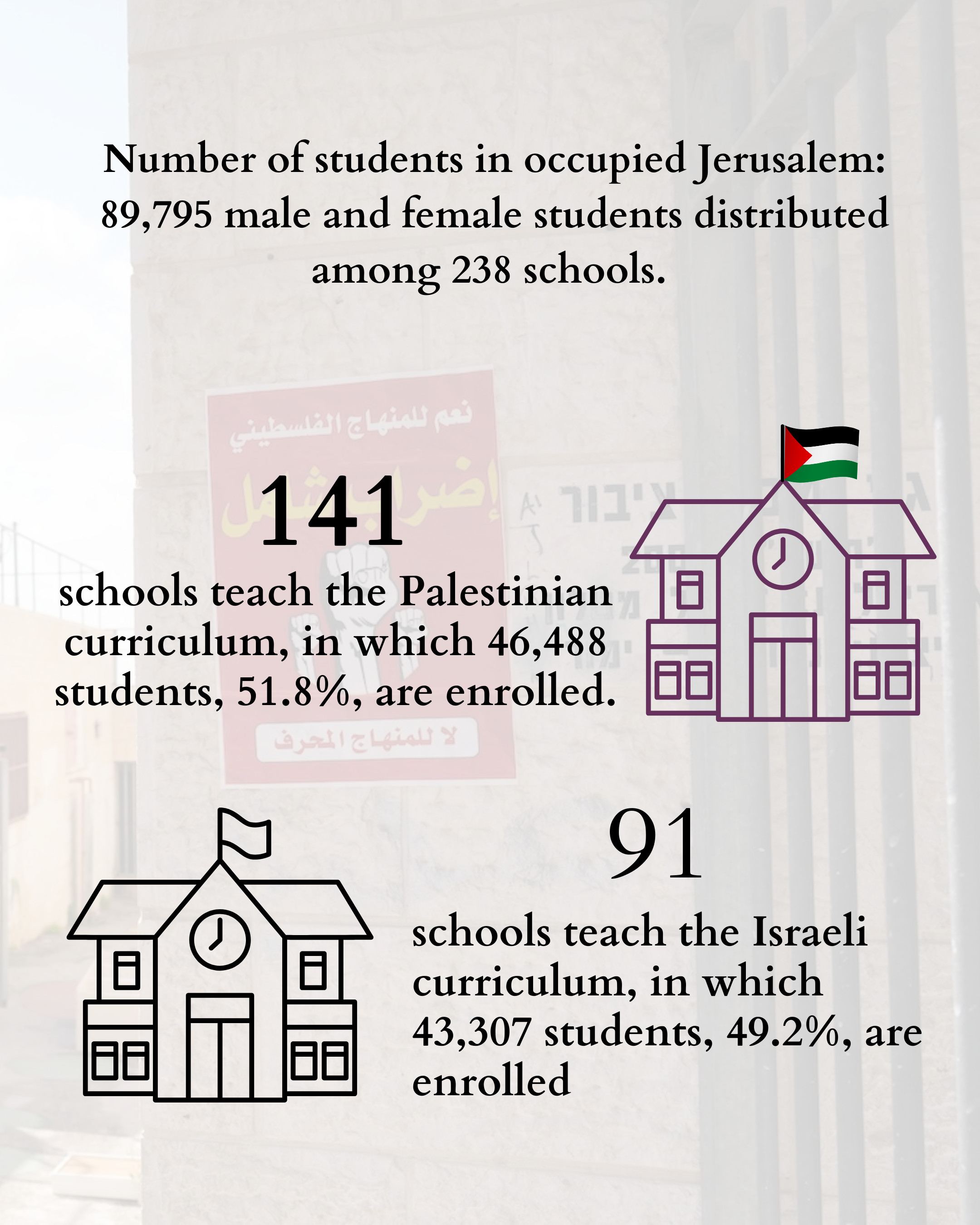
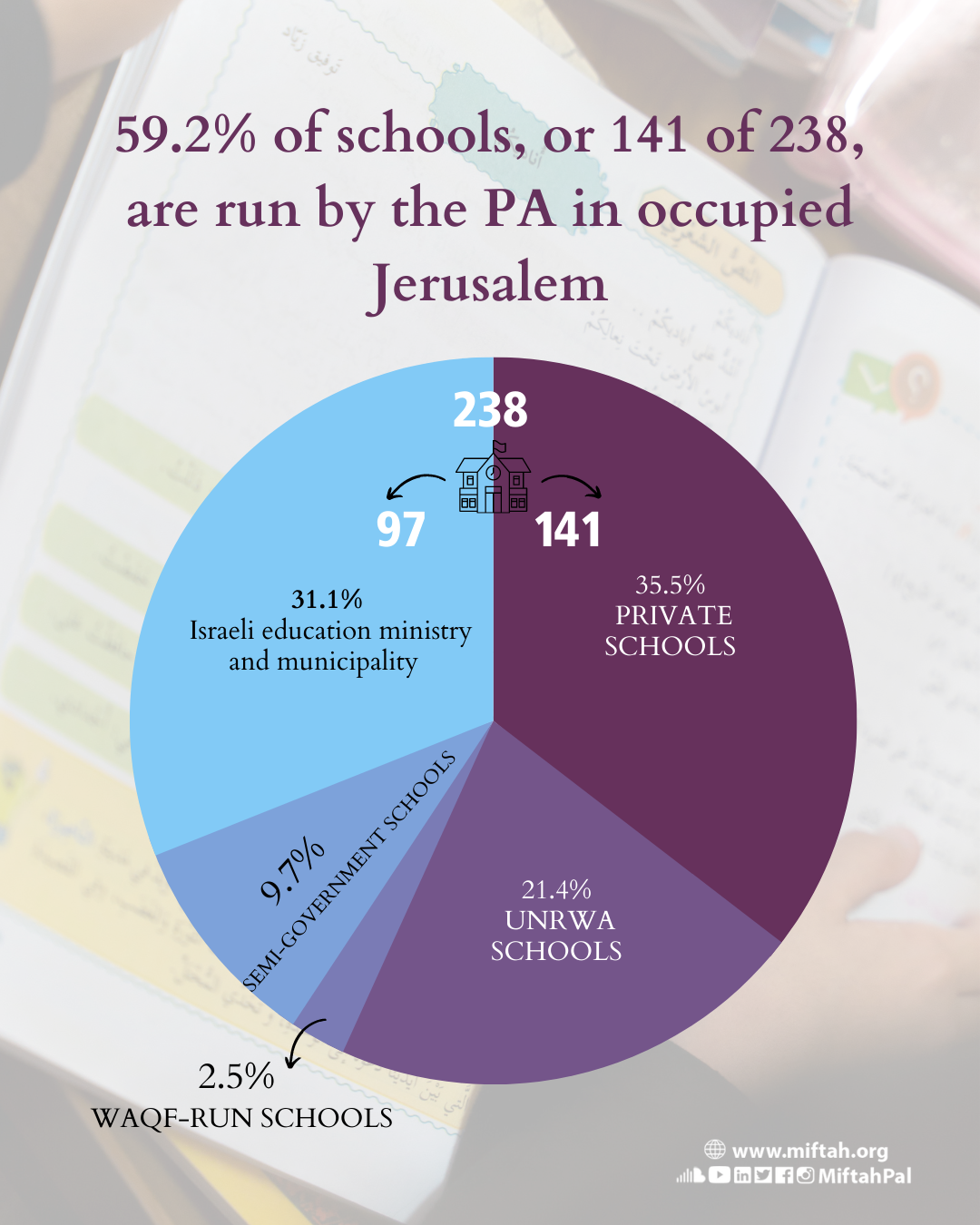
Getting to School:
Students and teachers must face 13 Israeli military checkpoints, strict measures, inspections and the annexation wall in order to reach their schools in Jerusalem every day.
Since 2000, Israeli occupation authorities have made it more and more difficult for teachers with West Bank IDs to work in occupied Jerusalem by denying them work permits, holding them up at military checkpoints or even arresting them. Today, they are less than 20% of the teaching staff in the city after comprising 60%.
Girls in particular, face harassment on their way to school. In a factsheet prepared by MIFTAH, in cooperation with the Women’s Studies Center, 30 female students from different schools in the city were interviewed, all of whom gave accounts of harassment at military checkpoints, on the street or in crowded public transportation, by Israeli army soldiers and/or settlers:
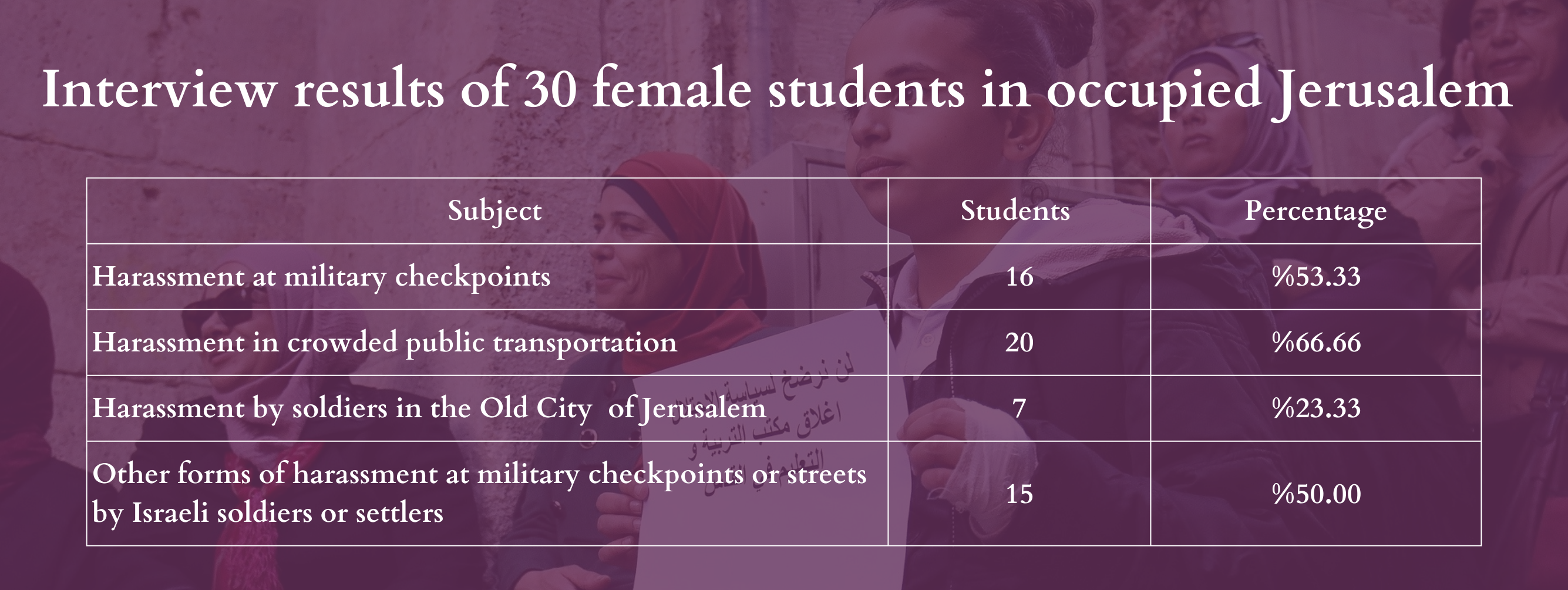
Ali and Eliya…fighting Israelization with awareness
Every morning, Ali and Eliya Farrah leave the house early to get to school, riding with their mother from the town of Sur Baher, south of Jerusalem, all the way to the Ibrahimieh School in Suwwana, east of the Old City. Every day, they try to reach on time because of the bad traffic due to military checkpoints, some permanent, others unexpected. The congestion is especially bad in areas such as Kufr Aqab and Qalandiya, which are surrounded by the annexation wall. This usually means parents leave the house with their children a good two hours before the first bell rings.
Today, siblings Ali and Eliya face yet another challenge. The illegitimate Israeli Jerusalem municipality is trying to impose the Israeli curriculum in their schools. The children are defiant, refusing to accept Israeli schoolbooks, saying this goes against their convictions, culture and national identity.
Israeli occupation authorities formulated a (2018-2022) five-year plan to take control over education in Jerusalem. The plan is based on six points:
One: Emptying the Old City of schools, taking control of its historical buildings and turning some of them into tourist attractions.
Two: Closing UNRWA schools in Jerusalem and absorbing its students in schools that teach the Israeli curriculum
Three: Closing private schools in the city that refuse to teach the Israeli curriculum
Four: Closing private kindergartens and opening municipality-run kindergartens.
Five: Opening community centers aimed at normalizing with Israel through various activities targeting children and youth.
Six: Deploying “citizen police” in Jerusalem neighborhoods, which work in conjunction with the Israeli Ministry of Social Affairs.
Palestinian Jerusalemites are trying to stand up to Israeli occupation authorities, which want to erase the Palestinian national identity by every possible measure and tactic. They are using the limited resources at their disposal and must make do with unfit buildings and largely unsuitable educational facilities in addition to dealing with multiple educational references in the city.
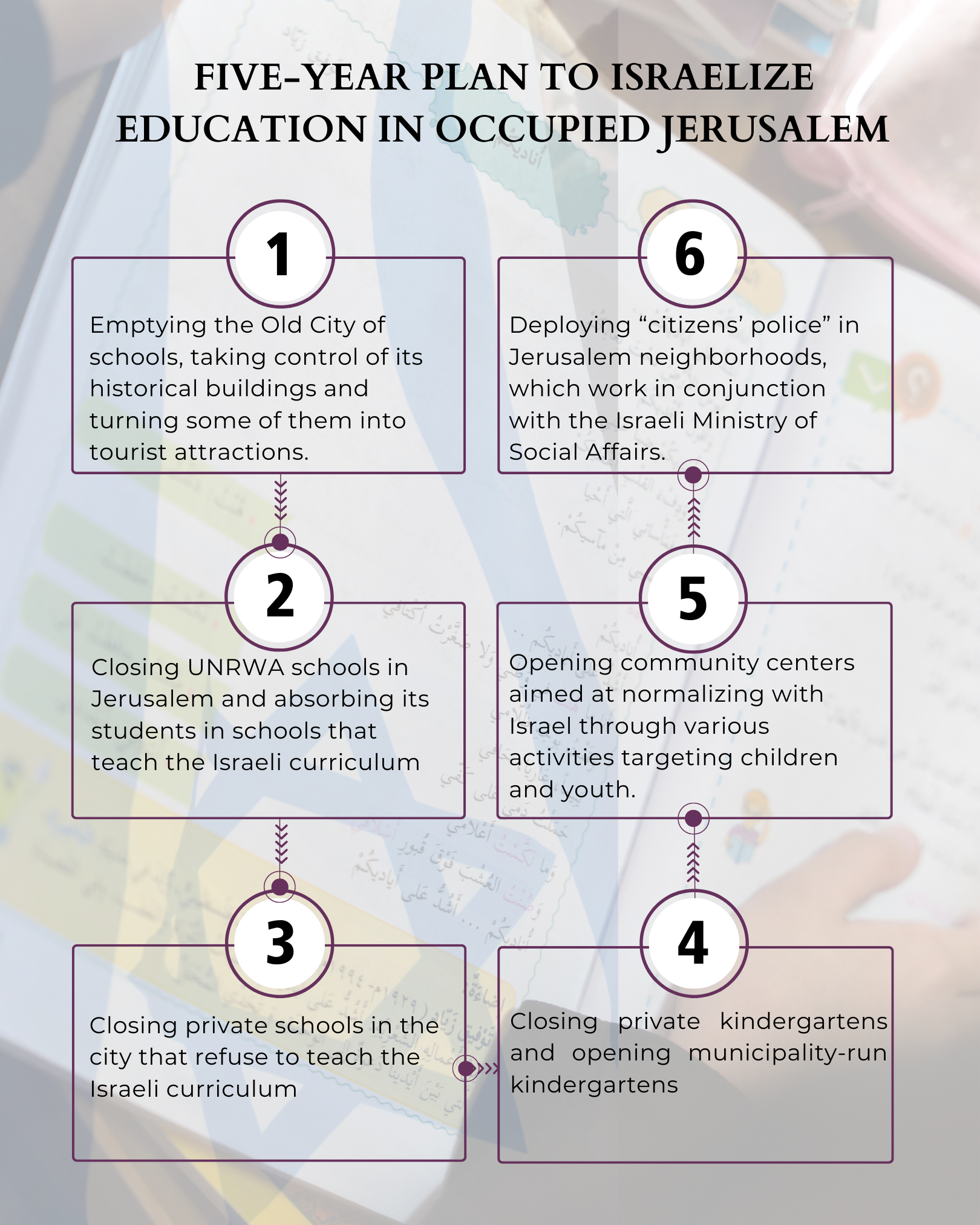
How are Jerusalemites confronting the Israelization of their curriculum?
Jerusalemites have been fighting Israeli attempts to impose their curriculum on schools through insisting on the Palestinian curriculum and keeping their Palestinian identity alive at home, even when students are forced to deal with the Israeli curriculum.
Palestinians also carried out several popular initiatives, endorsed by the Palestinian Ministry of Education and the Faisal Husseini Foundation, including the creation of parents’ committees to distribute Palestinian schoolbooks for free, to the targeted schools. They held demonstrations in front of schools, while official Palestinian parties promised to support and fund plans to improve the quality of competitive education in the city, the goal of which is to promote Palestinian identity and deepen Jerusalemites’ awareness of the importance of national education, the pitfalls of Israel’s plans and means of challenging them.
Meanwhile, a local initiative was launched, led by popular bodies and youth movements to encourage a return to schools in the Old City, namely “Al Aytam School.” The objective was to encourage hundreds of students to re-enroll in the school by offering incentives such as distributing schoolbooks to the students and even providing pocket money for each child to alleviate some of the financial burdens on parents.
Education and the Law:
Several international human rights conventions guarantee the right to education as a basic human right, placing safeguards for its protection. The right to education is a human right. Education, which is considered a right for empowerment, is the main tool that enables the old, the young and the economically and social marginalized, to pull themselves out of poverty and obtain means to fully participate in their communities. Education also plays a vital role in the empowerment of women and in the protection of children from dangerous child labor and exploitation.
The International Covenant on Economic, Social and Cultural Rights is considered the most comprehensive and detailed agreement that addresses the right to education in terms of its objective, the nature of the educational process and the means for all persons to acquire it, without discrimination.
The State Parties to the Covenant undertake to respect the freedom of parents or guardians to choose schools for their children other than public schools, as long as these schools adhere to the minimum educational standards imposed or approved by the state. They also pledge to ensure that the religious and moral upbringing of the children is in accordance with their convictions.
Hence, the practices of the occupying power are a flagrant violation of international law by erasing cultural heritage. They also contravene with Israel’s obligations under CEDAW (Committee on the Elimination of Discrimination against Women) in occupied Jerusalem.
14 Emil Touma Street,
Al Massayef, Ramallah
Postalcode P6058131
P.O.Box 69647
Jerusalem
972-2-298 9490/1
972-2-298 9492
info@miftah.org





